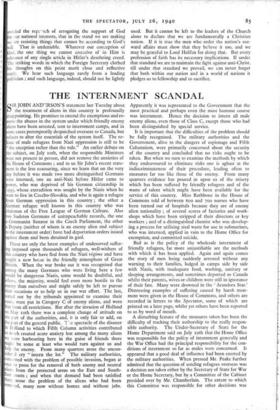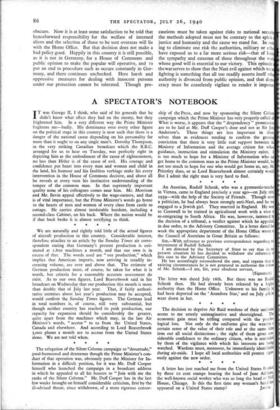THE INTERNMENT SCANDAL
IR JOHN AND'IRSON'S statement last Tuesday about the treatment of aliens in this country is profoundly sappointing. He promises to extend the exemptions and re- ove the abuses in the system under which friendly enemy ens have been arrested, sent to internment camps, and in ome cases peremptorily despatched overseas to Canada, but fuses to alter the essentials of the system itself. The re- ease of male refugees from Nazi oppression is still to be 'the exception rather than the rule." An earlier debate on e subject, on July' loth, when the responsible Ministers re not present in person, did not remove the anxieties of he House of Commons ; and to us Sir John's recent state- ent is the less reassuring, since we learn that on the very ay before 'it was made two more distinguished Germans vere interned, one an anti-Nazi before Hitler came to ower, who was deprived of his German citizenship in 1935, whose extradition was sought by the Nazis when he ent to live in Czecho-Slovakia, and who is again a refugee om German oppression in this country ; the other a rman refugee well known in this country who was hairman of the Free League of German Culture. Also o Sudeten Germans of unimpeachable records, the one Communist Senator in the Czech Parliament, the other Deputy (neither of whom is an enemy alien and subject o the internment order) have had deportation orders issued gainst them and been detained in gaol.
These are only the latest examples of undeserved suffer- g imposed- upon thousands of refugees, well-wishers of his country who have fled from the Nazi regime and have ought a new home in the friendly atmosphere of Great ritain. When the war broke out it was recognised that ong the many Germans who were living here a few ould be dangerous Nazis, some would be doubtful, and hers, the majority, would feel even more hostile to the nemy than _ourselves and might safely be left to pursue cir vocations or to help us in our war effort. The last, orted out by the tribunals appointed to examine their ases, were put in Category C of enemy aliens, and were ee from all restrictions. But after the invasion of Holland o May loth there was a complete change of attitude on he part of the authorities, and, it is only fair to add, on he part of the general public. The spectacle of the disaster ti Holland to which Fifth Column activities contributed 0 much created acute anxiety lest among the many aliens e were harbouring here in the guise of friends there ght be some at least who would turn against us and elp the enemy. From many quarters arose the uncon- idered cry "intern the lot." The military authorities, oncerned with the problem of possible invasion, began at nce to press for the removal of both enemy. and neutral ens from the protected areas on the East and South- ast coasts ; and when that demand had been satisfied ere arose the problem of the aliens who had been enloyed, many now without homes and without jobs.
Apparently it was represented to the Government that the most practical and perhaps even the most humane course was internment. Hence the decision to intern all male enemy aliens, even those of Class C, except those who had been distinguished by special service.
It is important that the difficulties of the problem should be fully recognised. The military authorities and the Government, alive to the dangers of espionage and Fifth Columnism, were primarily concerned about the security of the country and concluded that no risks ought to be taken. But when we turn to examine the methods by which they endeavoured to eliminate risks one is aghast at the indiscriminateness of their procedure, leading often to measures far too like those of the enemy. From many quarters evidence has poured in upon us of the misery which has been suffered by friendly refugees and of the waste of talent which might have been available for the service of this country. Miss Rathbone in the House of Commons told of between 600 and 700 nurses who have been turned out of hospitals because they are of enemy alien nationality ; of several scores of factories and work- shops which have been stripped of their directors or key workers ; and of a distinguished chemist who was develop- ing a process for utilising sisal waste for use in submarines, who was interned, applied in vain to the Home Office for exemption, and committed suicide.
Bad as is the policy of the wholesale internment of friendly refugees, far more unjustifiable are the methods with which it has been applied. Again and again comes the story of men being suddenly arrested without any warning to their families, lodged in camps side by side with Nazis, with inadequate food, washing, sanitary or sleeping arrangements, and sometimes deported to Canada whilst their parents, wives or children were still in ignorance of their fate. Many were drowned in the Arandora Star.' Distressing examples of suffering caused by harsh treat- ment were given in the House of Commons, and others are recorded in letters to the Spectator, some of which are printed on a later page, whilst yet others have been reported to us by word of mouth.
A disturbing feature of the measures taken has been the difficulty of tracking their authorship to the really respon- sible authority. The Under-Secretary of State for the Home Department said on July loth that the Home Office was responsible for the policy of internment generally and the War Office had the principal responsibility for the con- ditions of internment so far as males were concerned. It appeared that a good deal of influence had been exerted by the military authorities. When pressed Mr. Peake further admitted that the question of sending refugees overseas was a decision not taken either by the Secretary of State for War or the Home Secretary, but by a Committee of the Cabinet presided over by Mr. Chamberlain. The extent to which this Committee was responsible for other decisions was obscure. Now it is at least some satisfaction to be told that henceforward responsibility for the welfare of interned aliens and the selection of those to be sent overseas will lie with the Home Office. But that decision does not make a bad policy good. Happily in this country it is still possible, as it is not in Germany, for a House of Commons and public opinion to make the popular will operative, and to put an end to procedure such as occurs constantly in Ger- many, and there continues unchecked. Here harsh and oppressive measures for dealing with innocent persons under our protection cannot be tolerated. Though pre- cautions must be taken against risks to national secun the methods adopted must not be contrary to the spirit justice and humanity and the cause we stand for. In seek ing to eliminate one risk the authorities, military or oth have exposed us to a far more serious risk—that of losi the sympathy and esteemn of those throughout the NA or whose good will is essential to our victory. This episode the war serves to show that the Nazi evil against which we fighting is something that all too readily asserts itself wh authority is divorced from public opinion, and that den cracy must be ceaselessly vigilant to render it impoten































 Previous page
Previous page